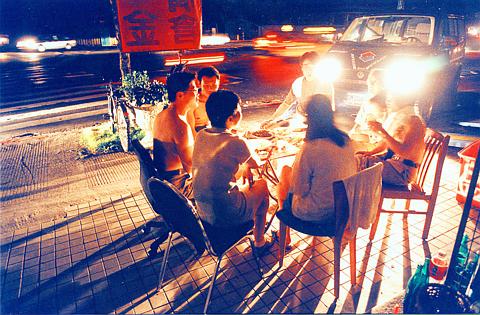Responding to a study released yesterday by the Cabinet-level Research, Development and Evaluation Commission (
"We've been frustrated by previous failures to buy land in rural areas suitable for building high-voltage towers. It's difficult to guarantee power supply in such a situation," said Lee Gan-charng (
At a draft review meeting on the study held yesterday, commission officials said that in the wake of two islandwide power outage incidents on July 29 and Sept. 21, finding ways to enhance the reliability of the electrical supply has become a priority.

PHOTO: CHANG CHIA-MING, LIBERTY TIMES
"In Taiwan, the power policy has long focused on power generation rather than electricity transmission. This makes providing reliable power transmission more challenging than elsewhere.
In addition, a commonly seen "not in my backyard" attitude toward public construction makes building high-voltage towers in rural areas more difficult," said the commission's chairman, Wea Chi-lin (
In the study, researchers from the Chung-hua Institute for Economic Research (??華經濟研究院) pointed out the irony of Taipower's policy of transferring power supplies from southern Taiwan to the north (南1q北送). Researchers argued that problems exist in several places, including the maintenance of the electrical system's security, the management of electricity transmission congestion and electricity shortage crises.
"To prevent future islandwide power outages, Taipower should disperse its generating system and adopt alternatives, including portable power generator systems and floating barge generators, both of which have been adopted in other countries where blackouts frequently occur, such as New Zealand and Japan," said George Hsu (3志義), one of the leading researchers behind the study.
However, experts suggested reviewing the existing grid structure first, at least as long as no alternatives are available.
"The existing transmission system is becoming increasingly fragile as demand increases. In engineering terms, I suggest monitoring power transmission at critical locations such as at Lungchi (龍崎), Chungliao (??寮), and Lungtan (龍潭)," said Chen Shih-lin (3?h麟), an electrical engineering professor from National Tsing Hua University.
According to Taipower, the July 29 power outage was the result of the collapse of a high-voltage tower at Lungchi, Tainan County, while the islandwide blackout after the 921 earthquake could be attributed to the shutdown of a transformer station at Chungliao, Nantou County.
The power transmission substation at Lungtan, Taoyuan County currently plays an important role in transmitting power to the north.
In addition, researchers suggest in the study that the government should adjust its existing price policy, as well as the structure of the industry.
"The promotion price for industry is outdated," said Wu Chung-chi (
While Taipower, under the supervision of the Commission of National Corporations (CNC,
"We've had both local and foreign experts study Taipower's two previous outages. A final report from a foreign team will be available in two weeks, which will be an important reference for adjusting policies," said CNC official Huang Jung-tzu (

MAKING WAVES: China’s maritime militia could become a nontraditional threat in war, clogging up shipping lanes to prevent US or Japanese intervention, a report said About 1,900 Chinese ships flying flags of convenience and fishing vessels that participated in China’s military exercises around Taiwan last month and in January last year have been listed for monitoring, Coast Guard Administration (CGA) Deputy Director-General Hsieh Ching-chin (謝慶欽) said yesterday. Following amendments to the Commercial Port Act (商港法) and the Law of Ships (船舶法) last month, the CGA can designate possible berthing areas or deny ports of call for vessels suspected of loitering around areas where undersea cables can be accessed, Oceans Affairs Council Minister Kuan Bi-ling (管碧玲) said. The list of suspected ships, originally 300, had risen to about

DAREDEVIL: Honnold said it had always been a dream of his to climb Taipei 101, while a Netflix producer said the skyscraper was ‘a real icon of this country’ US climber Alex Honnold yesterday took on Taiwan’s tallest building, becoming the first person to scale Taipei 101 without a rope, harness or safety net. Hundreds of spectators gathered at the base of the 101-story skyscraper to watch Honnold, 40, embark on his daredevil feat, which was also broadcast live on Netflix. Dressed in a red T-shirt and yellow custom-made climbing shoes, Honnold swiftly moved up the southeast face of the glass and steel building. At one point, he stepped onto a platform midway up to wave down at fans and onlookers who were taking photos. People watching from inside

Japan’s strategic alliance with the US would collapse if Tokyo were to turn away from a conflict in Taiwan, Japanese Prime Minister Sanae Takaichi said yesterday, but distanced herself from previous comments that suggested a possible military response in such an event. Takaichi expressed her latest views on a nationally broadcast TV program late on Monday, where an opposition party leader criticized her for igniting tensions with China with the earlier remarks. Ties between Japan and China have sunk to the worst level in years after Takaichi said in November that a hypothetical Chinese attack on Taiwan could bring about a Japanese

The WHO ignored early COVID-19 warnings from Taiwan, US Deputy Secretary of Health and Human Services Jim O’Neill said on Friday, as part of justification for Washington withdrawing from the global health body. US Secretary of State Marco Rubio on Thursday said that the US was pulling out of the UN agency, as it failed to fulfill its responsibilities during the COVID-19 pandemic. The WHO “ignored early COVID warnings from Taiwan in 2019 by pretending Taiwan did not exist, O’Neill wrote on X on Friday, Taiwan time. “It ignored rigorous science and promoted lockdowns.” The US will “continue international coordination on infectious